 ★★★½
★★★½
“Sympathy for the devil.”
Alright, this needs some background first, so I’ll try my best to give the necessary information. Date a Bullet is a two-part spin-off movie from Date a Live. This was originally a light novel series, that became a manga and then an anime series. The last-named started in 2013 and is currently in its fourth season: it also previously got a pair of OVAs and one movie. This is the second film, though is essentially two episodes that were put together, and released in cinemas as a movie, despite a very short length of 50 minutes.
Date a Live was (and still is) as bonkers a basic premise as anime shows can be. A catastrophe 30 years ago causes spirits to appear in our world – until now, always in the form of beautiful girls. What are the odds? If the spirit is stressed or aggravated, she causes earthquakes and natural disasters. A little advice from me: how about the defense services NOT attack at the very first sight of such a spirit? Just an idea… A secret organisation protecting mankind from them has figured out a new way of dealing with these girls. The young, naive student Shido has to approach them, built up confidence and go on a date with them. When he kisses them he “seals in” their powers by doing so. This usually results in the spirit stopping being dangerous and moving into Shido’s home (where are his parents?). For the remainder of the episodes he is busy, trying to cope with school, the emotional needs of the girls and cooking for them all.
I guess there’s something that show wants to teach young Japanese men how to deal with girls. The whole secret organisation’s spaceship team (lead by Shido’s younger sister?) is trying to figure out the best of three responses for Shido when talking to the girls, and usually chooses the worst possible. Hilarity ensues. But somehow I couldn’t feel anything for Shido except for pity, dealing with all these girls wanting so many different things from him. It can’t be easy to be one of those beloved students in what we call nowadays a “harem anime”. There are plenty more of these where this comes from! The show is based on the idea of a so-called dating-app or game that helps train your dating skills before going into the wild, where untamed femininity can overwhelm an innocent, anxious Japanese boy. The idea is not the worst: I could have used such a tool when I was younger!
But this is a different beast, because it deals with the extraordinary character of Kurumi Tokisaki (Sanada), who is really different to all the other girls Shido met in the main show. Usually, meeting a girl spirit meant that, to cut a long story short, Shido would kiss the girl, or she, enchanted by Shido’s friendliness would kiss him – it has to be voluntarily. She’d join his harem, while they all crave his attention, everyone wanting a piece of him, his time, physical contact and so on. Not Kurumi. When she first appeared in the show, she seemed the girl spirit of this half-season, so to speak, but then quickly turned the tables.
 While the other girls might be complicated and have problems, like feeling unloved, being shy and, in one case, not even being into men, there always was a solution. Kurumi is… different: Shido soon found out she was there to sexually arouse him, so she could “eat him”. We can argue about the not-so subtle subtext: male Japanese anxiety about a sexually demanding and active woman. In the very same episode, some boys make sexually charged comments about her, she lures them into the shadows… next the blood is dripping from the walls.
While the other girls might be complicated and have problems, like feeling unloved, being shy and, in one case, not even being into men, there always was a solution. Kurumi is… different: Shido soon found out she was there to sexually arouse him, so she could “eat him”. We can argue about the not-so subtle subtext: male Japanese anxiety about a sexually demanding and active woman. In the very same episode, some boys make sexually charged comments about her, she lures them into the shadows… next the blood is dripping from the walls.
Yeah, cute-looking Kurumi in sexy red-black lingerie is a killer, a femme fatale and if I’m not mistaken (correct me if I’m wrong), falls into the popular category of the “yangires”, female psychotic anime characters that can go on a bloody rampage at the slightest provocation. She is the killer shark among Shido’s girl. But then, she never becomes part of his actual haremm because they never kissed. Innocent Shido would have been dead meat. There may be a hint of Kurumi being abused in her former life; it could just be me, trying to read between the lines.
In a show that follows the usual rules of harem anime, a character like this is almost a provocation, riding roughshod over those unwritten rules. Kurumi is a force to be reckoned with. Her left eye features the yellow dial of a clock: with her magical calling of “Zaphkiel”, an angel that can manipulate time and appears as a giant dial, she can actually turn time around. By shooting her gun into her own head she can replicate herself and create as many clones of herself as she wants. Magically she appears to be independent, she can appear wherever and whenever she wants.
For most of the show she has been the “punch clock villain”, someone you could expect to appear sooner or later in the show. Though she seems to soften her attitude to Shido, after her first encounters with Shido, where he unsuccessfully tried to reason with and find an emotional angle on her – that worked with the other spirits. In one episode, she goes on a date with him, only to be shot by a superior version of herself at the end, This clone was obviously trying to fulfill her supressed romantic desires. In a late season 3 episode, she even helped him travel back in time to prevent a catastrophe that would send one of his girlfriends on a later revenge trip against the other girl spirits.
Okay. On to Date a Bullet , which is exceptional in the Date a Live universe as it tells a story with Kurumi as the main character. There’s no Shido to be found here, none of the harem girls or supporting characters appear, It’s as if you took a bad Bond girl and gave her a solo movie. So, quite unusual! So, what’s the story? Kurumi finds herself in an alternate world where she is told she is in a battle royale. The winner gets a wish, and might even be able to return to her own world. As she is being told by a small girl who functions as comic relief, that the combatants are all “half-spirits”, Kurumi in her no non-sense manner declares her in quite clear terms that she considers herself a full spirit, not a half one. Then there is the character of the White Queen, an especially dangerous ghost she will sooner or later have to face.
The movie is well-made, though the DVD is definitely too expensive for just ran 50 minutes. It’s entertaining enough, though as expected, too short to build up much tension. But it also serves mainly to show that Kurumi has a heart, too. Flashbacks show a younger Kurumi when she was alive and in school with the one friend she had, Sawa Yamauchi, dreaming of how it will be when she will have a boyfriend. While you can easily guess who the White Queen is, Kurumi shows during the story how tough and no-nonsense she is. She is thankful for help, but this doesn’t mean she’s so naive as to trust you immediately. She has a softer side, too, saving a little cat that plays a special role in the story, and at the end seems to have found a pet that might accompany her in future. Though why she killed her best friend in the past, remains unanswered.
The film helped understand the character a bit better and gave her the limelight she deserves. I wouldn’t say we know everything about Kurumi Tokisaki now though. The character stays interesting and as Date a Live with its funny situations and cute/sexy girls is something of a guilty pleasure for me, I look forward for a dubbed version of season four, and discovering what kind of role Kurumi will play in it.
Dir: Jun Nakagawa
Star (voice): Asami Sanada. Asami Seto, Kaede Hondo, Mariya Ise
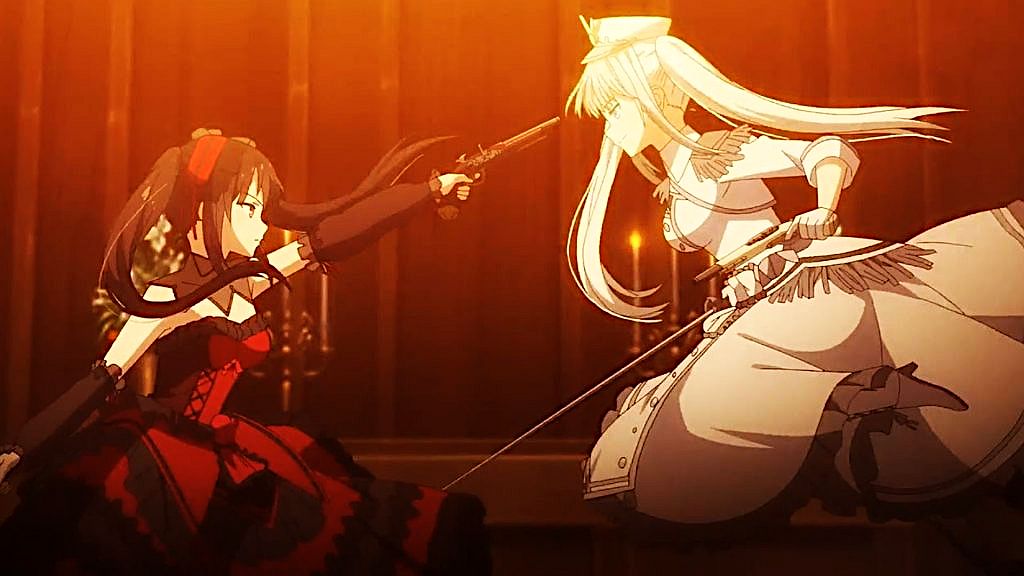
 There seem to have been quite a few movies out of Europe over the past couple of years, about the female soldiers fighting in Kurdistan for independence with the PKK and related groups. French films Les Filles du Soleil and Soeurs D’Armes both covered similar territory. It seems fertile territory, offering an inbuilt contradiction between the general perception of how Islam treats women, and them taking part in front-line action, in a way well beyond what “liberal” Western democracies typically allow. Oddly, it feels as if most of the stories being told, involve a search for relatives, and I’m a bit ambivalent about this. It feels slightly lazy writing, as if there’s no other reason a woman could want to take up arms in order to defend her homeland.
There seem to have been quite a few movies out of Europe over the past couple of years, about the female soldiers fighting in Kurdistan for independence with the PKK and related groups. French films Les Filles du Soleil and Soeurs D’Armes both covered similar territory. It seems fertile territory, offering an inbuilt contradiction between the general perception of how Islam treats women, and them taking part in front-line action, in a way well beyond what “liberal” Western democracies typically allow. Oddly, it feels as if most of the stories being told, involve a search for relatives, and I’m a bit ambivalent about this. It feels slightly lazy writing, as if there’s no other reason a woman could want to take up arms in order to defend her homeland.




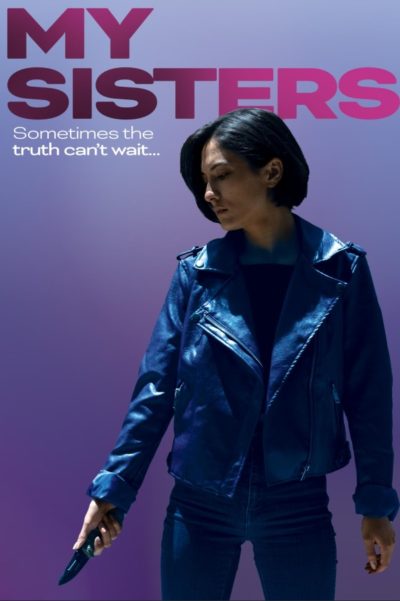 This felt oddly familiar, like I had watched it before. One scene in particular – a maintenance man comes to replace a light-bulb, only to become an apparent threat – had me
This felt oddly familiar, like I had watched it before. One scene in particular – a maintenance man comes to replace a light-bulb, only to become an apparent threat – had me 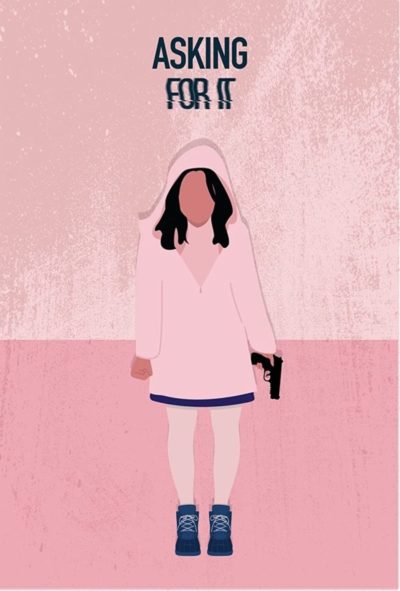 Not to be confused with the 2022 rape-revenge film of the same name (which I’ll get round to reviewing down the pipe), this is somewhat lighter in tone, though there’s a case to be made that this clashes terribly with the subject matter. Jenny (Hsu) is a journalist, working under Cheryl (Garofalo),and her work has brought her to the attention of an online stalker, who sends her increasingly disturbed and disturbing emails. When the harassment begins to move from the cyberworld into the real one, and the authorities fail even to reach the level of disinterest, Jenny teams up with room-mate Lisa (Morales), to hunt down the perpetrator and bring him to justice themselves.
Not to be confused with the 2022 rape-revenge film of the same name (which I’ll get round to reviewing down the pipe), this is somewhat lighter in tone, though there’s a case to be made that this clashes terribly with the subject matter. Jenny (Hsu) is a journalist, working under Cheryl (Garofalo),and her work has brought her to the attention of an online stalker, who sends her increasingly disturbed and disturbing emails. When the harassment begins to move from the cyberworld into the real one, and the authorities fail even to reach the level of disinterest, Jenny teams up with room-mate Lisa (Morales), to hunt down the perpetrator and bring him to justice themselves. Giving your film a title like this is basically asking for trouble. It gives snarky critics an extremely easy weapon to wield against the movie. That’s especially so when it’s a low-budget effort, made with considerably more heart than skill. It’s not without merit, especially in the photography. It is crisp and does a good job of capturing some beautiful Montana scenery – there’s a reason the state is nicknamed Big Sky Country – and the rodeo action. The problems are in a script which never met a cliché it didn’t like, and performances that do little or nothing to elevate the material.
Giving your film a title like this is basically asking for trouble. It gives snarky critics an extremely easy weapon to wield against the movie. That’s especially so when it’s a low-budget effort, made with considerably more heart than skill. It’s not without merit, especially in the photography. It is crisp and does a good job of capturing some beautiful Montana scenery – there’s a reason the state is nicknamed Big Sky Country – and the rodeo action. The problems are in a script which never met a cliché it didn’t like, and performances that do little or nothing to elevate the material.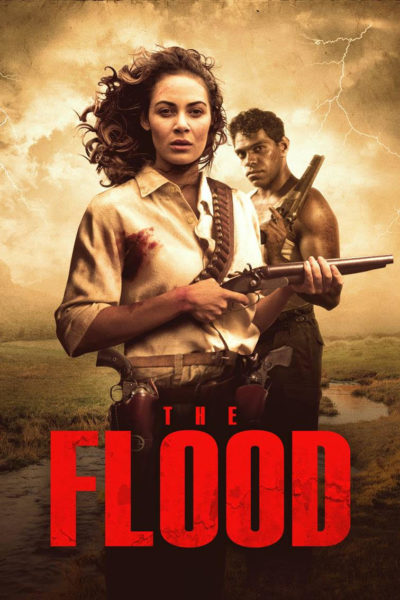 The first eighty or so minutes of this are really good: powerful, committed and extremely angry film-making. And justifiably so, I would say. Unfortunately, the film runs for a hundred and seventeen minutes, and definitely goes off the rails towards the end. The gritty realism which was perhaps the movie’s strongest suit is replaced by odd fantasy sequences, such as the fugitive couple suddenly dressed, in the middle of a forest, as if they were attending a Victorian embassy ball. I’m not certain what the point of these elements, or the anachronistic pop songs were. I am certain that they didn’t enhance my appreciation of the film in any way, and that’s a shame, considering how assured it had been in the early going.
The first eighty or so minutes of this are really good: powerful, committed and extremely angry film-making. And justifiably so, I would say. Unfortunately, the film runs for a hundred and seventeen minutes, and definitely goes off the rails towards the end. The gritty realism which was perhaps the movie’s strongest suit is replaced by odd fantasy sequences, such as the fugitive couple suddenly dressed, in the middle of a forest, as if they were attending a Victorian embassy ball. I’m not certain what the point of these elements, or the anachronistic pop songs were. I am certain that they didn’t enhance my appreciation of the film in any way, and that’s a shame, considering how assured it had been in the early going. ★★★½
★★★½ While the other girls might be complicated and have problems, like feeling unloved, being shy and, in one case, not even being into men, there always was a solution. Kurumi is… different: Shido soon found out she was there to sexually arouse him, so she could “eat him”. We can argue about the not-so subtle subtext: male Japanese anxiety about a sexually demanding and active woman. In the very same episode, some boys make sexually charged comments about her, she lures them into the shadows… next the blood is dripping from the walls.
While the other girls might be complicated and have problems, like feeling unloved, being shy and, in one case, not even being into men, there always was a solution. Kurumi is… different: Shido soon found out she was there to sexually arouse him, so she could “eat him”. We can argue about the not-so subtle subtext: male Japanese anxiety about a sexually demanding and active woman. In the very same episode, some boys make sexually charged comments about her, she lures them into the shadows… next the blood is dripping from the walls.
 Seeing this described as “an experimental thriller,” set my alarm bells ringing. I’ve seen enough “experimental” film in my time, to realize it’s typically a code-word meaning “incoherent rubbish.” The above rating is thus partially a reflection of my relief that this did not fall into that category. You still, very definitely, have to manage your expectations here. If you go in expecting a slick, Jason Bourne style adventure, you will be sorely disappointed. For this is a no-budget entity, largely guerilla filmed by a one-man crew, and with a lead actress who has no real experience. It has already significantly surpassed all my expectations, simply through not being a total disaster.
Seeing this described as “an experimental thriller,” set my alarm bells ringing. I’ve seen enough “experimental” film in my time, to realize it’s typically a code-word meaning “incoherent rubbish.” The above rating is thus partially a reflection of my relief that this did not fall into that category. You still, very definitely, have to manage your expectations here. If you go in expecting a slick, Jason Bourne style adventure, you will be sorely disappointed. For this is a no-budget entity, largely guerilla filmed by a one-man crew, and with a lead actress who has no real experience. It has already significantly surpassed all my expectations, simply through not being a total disaster. This is likely an admirable effort in terms of its budget. The IMDb estimates it costs $100,000 and it looks like Price squeezed every cent – or, since it’s British, penny – out of that. To give you some idea, also per the IMDb, “Sections of the film were shot during the Covid-19 United Kingdom lockdown with just the occupants of the director’s flat. The director’s girlfriend doubled for any actors and WhatsApp voice notes from cast members were used for any extra lines of dialogue.” This is the kind of thing that can only be respected. Which is why I feel a little bad about having to give this an underwhelming review, because… truth be told, it’s kinda boring.
This is likely an admirable effort in terms of its budget. The IMDb estimates it costs $100,000 and it looks like Price squeezed every cent – or, since it’s British, penny – out of that. To give you some idea, also per the IMDb, “Sections of the film were shot during the Covid-19 United Kingdom lockdown with just the occupants of the director’s flat. The director’s girlfriend doubled for any actors and WhatsApp voice notes from cast members were used for any extra lines of dialogue.” This is the kind of thing that can only be respected. Which is why I feel a little bad about having to give this an underwhelming review, because… truth be told, it’s kinda boring.  This is as much about the philosophical underpinnings of karate, and how it can be used for personal growth. The instigator in this case is Chae-yeong (Jung), a teenage girl who has just transferred to a new school after issues at her previous educational establishment. Her long-suffering father, a karate master has barely registered her there, when trouble finds Chae-yeong. She uses her skills to rescue a student, Jong-goo (Oh), who is refusing to help some bullies cheat in an upcoming exam. This turns out to get her an unwanted high profile, as the school is basically a gangsters’ paradise.
This is as much about the philosophical underpinnings of karate, and how it can be used for personal growth. The instigator in this case is Chae-yeong (Jung), a teenage girl who has just transferred to a new school after issues at her previous educational establishment. Her long-suffering father, a karate master has barely registered her there, when trouble finds Chae-yeong. She uses her skills to rescue a student, Jong-goo (Oh), who is refusing to help some bullies cheat in an upcoming exam. This turns out to get her an unwanted high profile, as the school is basically a gangsters’ paradise.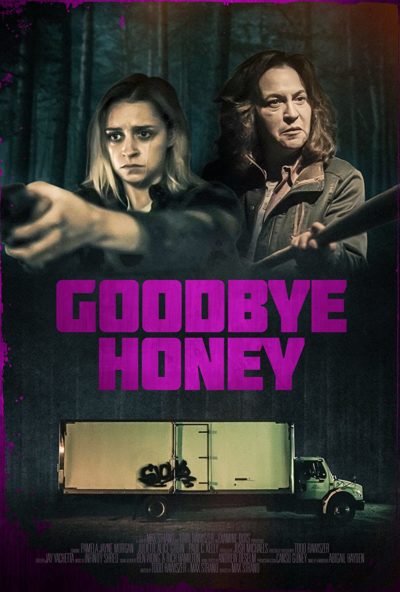 There is a good concept here. Unfortunately, rarely have I seen an idea so conspicuously derailed by dreadful execution. Let’s not get ahead of ourselves though, and begin by focusing on the positives here. Dawn (Morgan) is a truck driver who is on a cross-country route, and pulls off the road into a remote, wooded location for an obligatory rest stop. Barely has she come to a halt, when a terrified young woman, Phoebe (Gobin), shows up outside her cab, demanding help. She claims to have been abducted, and been held nearby. But she managed to escape from her kidnapper, who is now hot on her heels, with evil intentions. However, is the new arrival speaking the truth or is she dangerously deranged?
There is a good concept here. Unfortunately, rarely have I seen an idea so conspicuously derailed by dreadful execution. Let’s not get ahead of ourselves though, and begin by focusing on the positives here. Dawn (Morgan) is a truck driver who is on a cross-country route, and pulls off the road into a remote, wooded location for an obligatory rest stop. Barely has she come to a halt, when a terrified young woman, Phoebe (Gobin), shows up outside her cab, demanding help. She claims to have been abducted, and been held nearby. But she managed to escape from her kidnapper, who is now hot on her heels, with evil intentions. However, is the new arrival speaking the truth or is she dangerously deranged?